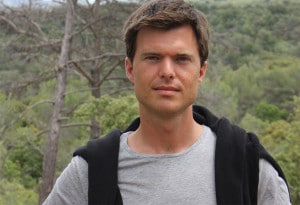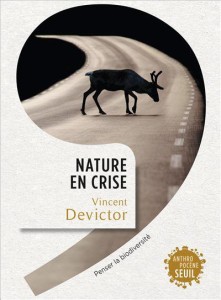The ecologist philosopher
Vincent Devictor is an ecologist atthe Institute of Evolutionary Sciences in Montpellier. He is a committed researcher who works to promote enlightened science. He aimed for the grandes écoles, but ended up at university. Was this a failure? No, it was a chance encounter.
 “I was immediately drawn to this world, its freedom, its high level of education, the passionate people you meet there—it's anything but a dead end.”It was above all a calling for the young man at the time: deeply concerned about protecting nature, he discovered conservation ecology and began to study the impact of human activities on the environment. “It is a science that is involved, committed, a science of urgency.”But it's not just a science... “The discipline combines ecology and ethics; it is a fairly recent approach that emerged in the 1980s.".
“I was immediately drawn to this world, its freedom, its high level of education, the passionate people you meet there—it's anything but a dead end.”It was above all a calling for the young man at the time: deeply concerned about protecting nature, he discovered conservation ecology and began to study the impact of human activities on the environment. “It is a science that is involved, committed, a science of urgency.”But it's not just a science... “The discipline combines ecology and ethics; it is a fairly recent approach that emerged in the 1980s.".
While Vincent Devictor devotes part of his work to understanding the impact of global changes on birds, he believes it is necessary to question the values involved in this work. “I wanted to take a different look at ecology, one that would give meaning to scientific work.“This perspective is that of philosophy.”Science is steeped in philosophical problems; we cannot understand anything unless we examine the history of values." emphasizes the ecologist, who is conducting his research alongside a philosophy thesis at the Sorbonne.to better understand the world we live in. To do science in an informed way.".
Giving meaning to science
 Investigating what has become of "nature" in representations, knowledge, and biodiversity policies allows us to discover how ethics, science, and politics intertwine." explains Vincent Devictor in his book Nature en crise* (Nature in Crisis), which sheds light on the major ecological crisis facing our society.
Investigating what has become of "nature" in representations, knowledge, and biodiversity policies allows us to discover how ethics, science, and politics intertwine." explains Vincent Devictor in his book Nature en crise* (Nature in Crisis), which sheds light on the major ecological crisis facing our society.
What paths are open to us in this societal challenge? Sustainable development and green growth? “These paths to consensus perpetuate the false but comforting idea that anything is possible.” Vincent Devictor emphasizes that he prefers to seriously question incompatibilities and conflicts of values. So what are the prospects for a way out of the crisis? “We must cultivate the search for new, more humble paths, with less excess, that resist the temptation to manage humans and nature as we manage corporate profits.".
How can we not be concerned about biodiversity in the face of rapid urbanization and the disappearance of many species? For the ecologist and philosopher, while there is cause for alarm, there are also reasons to be enthusiastic, particularly when we see that certain protective measures are working very well. Even if they are not enough...We have some good recipes to tackle this crisis, but there is no ideal menu.".
* Nature in Crisis by Vincent Devictor, Editions du Seuil, January 2015